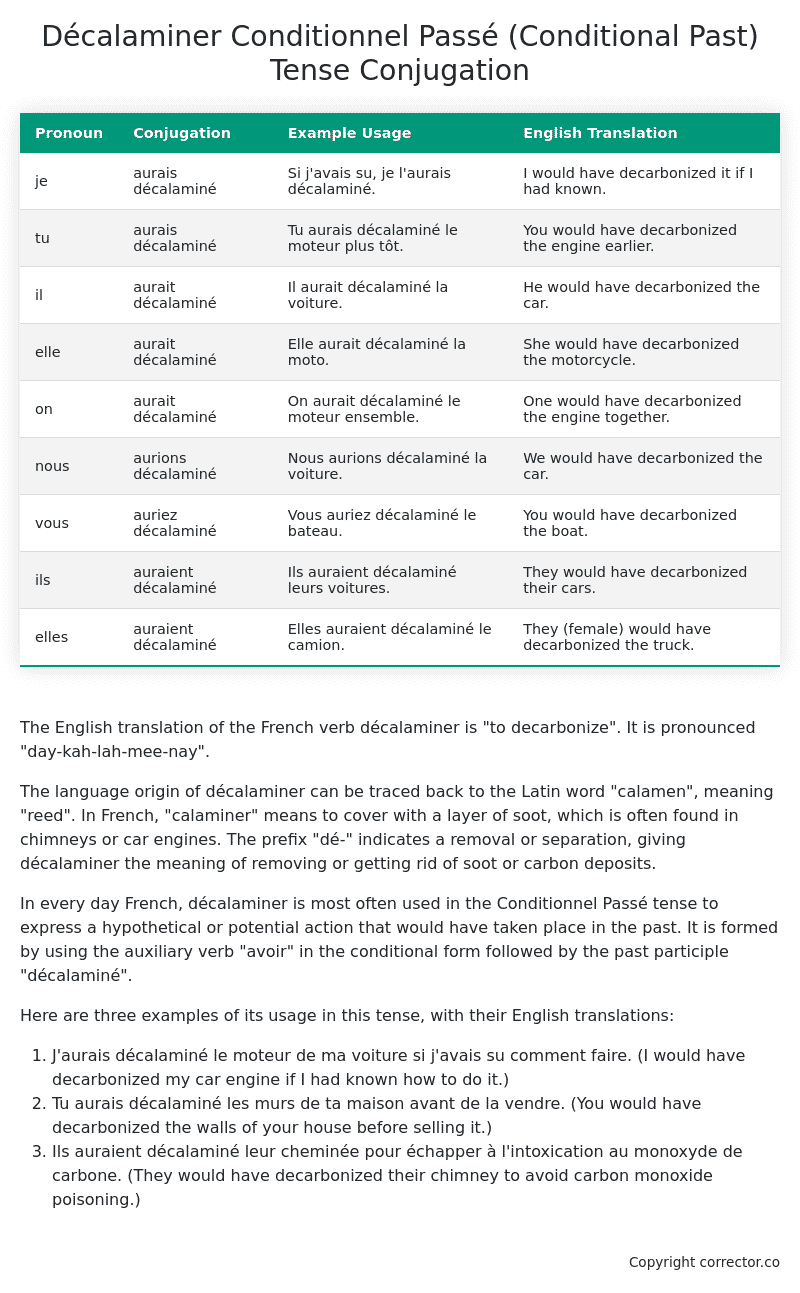Conditionnel Passé (Conditional Past) Tense Conjugation of the French Verb décalaminer
Introduction to the verb décalaminer
The English translation of the French verb décalaminer is “to decarbonize”. It is pronounced “day-kah-lah-mee-nay”.
The language origin of décalaminer can be traced back to the Latin word “calamen”, meaning “reed”. In French, “calaminer” means to cover with a layer of soot, which is often found in chimneys or car engines. The prefix “dé-” indicates a removal or separation, giving décalaminer the meaning of removing or getting rid of soot or carbon deposits.
In every day French, décalaminer is most often used in the Conditionnel Passé tense to express a hypothetical or potential action that would have taken place in the past. It is formed by using the auxiliary verb “avoir” in the conditional form followed by the past participle “décalaminé”.
Here are three examples of its usage in this tense, with their English translations:
- J’aurais décalaminé le moteur de ma voiture si j’avais su comment faire. (I would have decarbonized my car engine if I had known how to do it.)
- Tu aurais décalaminé les murs de ta maison avant de la vendre. (You would have decarbonized the walls of your house before selling it.)
- Ils auraient décalaminé leur cheminée pour échapper à l’intoxication au monoxyde de carbone. (They would have decarbonized their chimney to avoid carbon monoxide poisoning.)
Table of the Conditionnel Passé (Conditional Past) Tense Conjugation of décalaminer
| Pronoun | Conjugation | Example Usage | English Translation |
|---|---|---|---|
| je | aurais décalaminé | Si j’avais su, je l’aurais décalaminé. | I would have decarbonized it if I had known. |
| tu | aurais décalaminé | Tu aurais décalaminé le moteur plus tôt. | You would have decarbonized the engine earlier. |
| il | aurait décalaminé | Il aurait décalaminé la voiture. | He would have decarbonized the car. |
| elle | aurait décalaminé | Elle aurait décalaminé la moto. | She would have decarbonized the motorcycle. |
| on | aurait décalaminé | On aurait décalaminé le moteur ensemble. | One would have decarbonized the engine together. |
| nous | aurions décalaminé | Nous aurions décalaminé la voiture. | We would have decarbonized the car. |
| vous | auriez décalaminé | Vous auriez décalaminé le bateau. | You would have decarbonized the boat. |
| ils | auraient décalaminé | Ils auraient décalaminé leurs voitures. | They would have decarbonized their cars. |
| elles | auraient décalaminé | Elles auraient décalaminé le camion. | They (female) would have decarbonized the truck. |
Other Conjugations for Décalaminer.
Le Present (Present Tense) Conjugation of the French Verb décalaminer
Imparfait (Imperfect) Tense Conjugation of the French Verb décalaminer
Passé Simple (Simple Past) Tense Conjugation of the French Verb décalaminer
Passé Composé (Present Perfect) Tense Conjugation of the French Verb décalaminer
Futur Simple (Simple Future) Tense Conjugation of the French Verb décalaminer
Futur Proche (Near Future) Tense Conjugation of the French Verb décalaminer
Plus-que-parfait (Pluperfect) Tense Conjugation of the French Verb décalaminer
Passé Antérieur (Past Anterior) Tense Conjugation of the French Verb décalaminer
Futur Antérieur (Future Anterior) Tense Conjugation of the French Verb décalaminer
Subjonctif Présent (Subjunctive Present) Tense Conjugation of the French Verb décalaminer
Subjonctif Passé (Subjunctive Past) Tense Conjugation of the French Verb décalaminer
Subjonctif Imparfait (Subjunctive Imperfect) Tense Conjugation of the French Verb décalaminer
Conditionnel Présent (Conditional Present) Tense Conjugation of the French Verb décalaminer
Conditionnel Passé (Conditional Past) Tense Conjugation of the French Verb décalaminer (this article)
L’impératif Présent (Imperative Present) Tense Conjugation of the French Verb décalaminer
L’infinitif Présent (Infinitive Present) Tense Conjugation of the French Verb décalaminer
Struggling with French verbs or the language in general? Why not use our free French Grammar Checker – no registration required!
Get a FREE Download Study Sheet of this Conjugation 🔥
Simply right click the image below, click “save image” and get your free reference for the décalaminer Conditionnel Passé tense conjugation!

Décalaminer – About the French Conditionnel Passé (Conditional Past) Tense
Formation
Common Everyday Usage Patterns
Expressing Unreal Past Scenarios
Polite Requests or Suggestions
Expressing Doubt or Uncertainty
Interactions with Other Tenses
Conditional Present
Indicative Past Tenses
Conditional Future
Summary
Want More?
I hope you enjoyed this article on the verb décalaminer. Still in a learning mood? Check out another TOTALLY random French verb conjugation!


